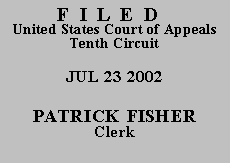

| UNITED STATES OF AMERICA,
Plaintiff - Appellee,
v.
AUGUSTINE OLIVAS Defendant - Appellant. |
No. 01-1387
(D.C. No. 99-CR-300-S) |
Anders holds that if counsel finds a case to be wholly frivolous after conscientious examination, he may so advise the court and request permission to withdraw. Counsel must also submit to both the court and his client a brief referring to anything in the record arguably supportive of the appeal. The client may then raise any point he chooses, and the court thereafter undertakes a complete examination of all proceedings and decides whether the appeal is in fact frivolous. If it so finds, it may grant counsel's request to withdraw and dismiss the appeal. See id. at 744. Counsel has provided Mr. Olivas with a copy of his appellate brief and Mr. Olivas has chosen not to file additional material with this court.
In his Anders brief, counsel identified only one potentially appealable issue for our consideration, whether the district court erred in denying Mr. Olivas' motions to suppress the results of the wiretaps. However, this issue is disposed of by the rule that a guilty plea waives all non-jurisdictional defenses occurring prior to entry of the plea. See Tollett v. Henderson, 411 U.S. 258, 266 (1973); United States v. Dwyer, 245 F.3d 1168, 1170 (10th Cir. 2001). Suppression issues are not jurisdictional and an unconditional guilty plea forecloses a defendant from obtaining review of a district court's order denying his motion to suppress. See United States v. Nooner, 565 F.2d 633, 634 (10th Cir. 1977) (citing Tollett, 411 U.S. at 267).
After careful review of the entire proceedings, we conclude that the record establishes no ground for appeal. We have found nothing in the record to indicate that Mr. Olivas' guilty plea was not knowing and voluntary, nor do we discern any error in the district court's denial of Mr. Olivas' motion to suppress. We GRANT counsel's request to withdraw and we DISMISS the appeal.
ENTERED FOR THE COURT
Stephanie K. Seymour
Circuit Judge
*.After examining appellant's brief and the appellate record, this panel has determined unanimously that oral argument would not materially assist the determination of this appeal. See Fed. R. App. P. 34(a)(2) and 10th Cir. R. 34.1(G). The case is therefore submitted without oral argument. This order and judgment is not binding precedent, except under the doctrines of law of the case, res judicata, or collateral estoppel. The court generally disfavors the citation of orders and judgments; nevertheless, an order and judgment may be cited under the terms and conditions of 10th Cir. R. 36.3.